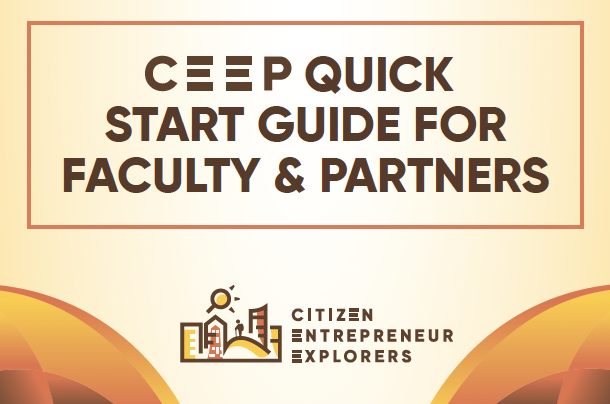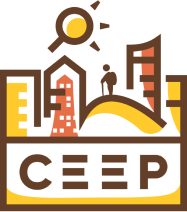
CEEP Resources
Starter OneSheet
The CEEP Faculty Quick Start Guide is a succinct, user-friendly resource designed to assist educators in implementing the Citizen Entrepreneur Explorers Program (CEEP) in their classrooms. It provides an overview of the program’s goals and structure, step-by-step instructions for each phase of the program, and tips on facilitating student engagement and learning. [OER DOWNLOAD]

“Citizen Entrepreneur Explorers Program helps student learn how to connect with the world around them by starting with their neighborhood.”
-Dr. Shane Snipes
CEEP Founder
Faculty Guide
The Comprehensive CEEP Faculty Guide is a detailed instructional manual aimed at providing faculty with an in-depth understanding and the necessary resources for executing the Citizen Entrepreneur Explorers Program (CEEP) effectively. It elucidates the program’s core principles, objectives, and each step of the process, supplemented with instructional strategies, examples, and best practices. This extensive guide is devised to empower educators to facilitate immersive, community-centric, and entrepreneurial learning experiences, fostering critical thinking, empathy, and innovative problem-solving skills among students, ensuring a holistic approach to community engagement and learning. [DOWNLOAD]
Student Guide
The Complete CEEP Student Guide is a thorough resource designed to assist students in navigating through the Citizen Entrepreneur Explorers Program (CEEP). It offers clear and concise instructions, examples, and insights for each step of the program, from discovering communities to reporting back findings. This guide is structured to enable students to engage deeply with their communities, fostering a sense of empathy, enhancing entrepreneurial thinking, and aiding in the development of research skills. It's a comprehensive companion for students aiming to maximize their learning and impact within their communities through CEEP. [DOWNLOAD]
OER CEEP Canvas Shell (level 2)
The CEEP Canvas Shell is an Open Educational Resource (OER) designed to facilitate seamless integration of the Citizen Entrepreneur Explorers Program (CEEP) into learning management systems. This resource contains all the essential materials, activities, and guides needed to implement CEEP in a structured learning environment, ensuring educators and students can easily access and navigate through the program’s components. It serves as a comprehensive framework, allowing participants to engage with their communities effectively and derive meaningful insights, fostering empathy, entrepreneurial thinking, and in-depth understanding of community dynamics. This OER is a valuable tool for institutions aiming to enrich their curriculum with experiential and community-focused learning through CEEP."
[DOWNLOAD - 39 MB] [CANVAS SHELL]
Full Resource List


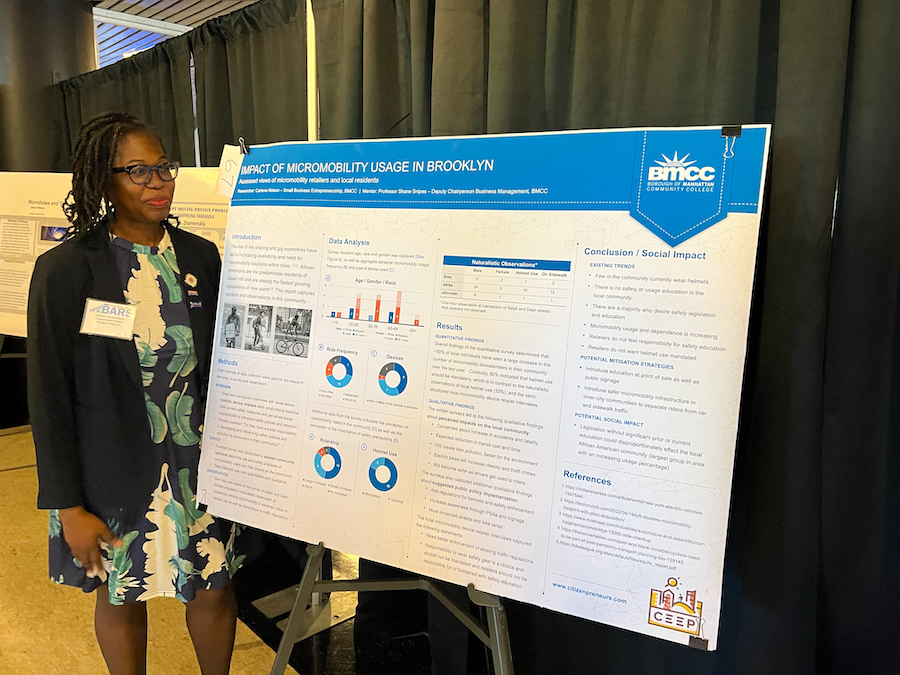
About Us
TEAM
The advancement of the materials since 2018 have been a collaborative effort, spearheaded by a diverse team of undergraduate and graduate students supported by a cadre of experienced faculty.
Tristan Rodriguez, with his background in screenwriting, imbues the project with a understanding of narrative structure. Jessica Pitts, delving into the realms of psychology for her Ph.D., brings insights into human behavior and cognition. Carlene Nelson's interdisciplinary approach as an undergraduate student provides a breadth of perspectives, enabling a exploration of research processes and pedagogical improvements.
The combination of their diverse insights is facilitated with the support from faculty members Romina DeNicola, Juan Sanchez, Monika Mitchell, and Tiffany Schreane, each lending their expertise to enrich the pedagogical solidity and relevance of the materials.
Dr. Shane Snipes could not have done any of it without the passionate and knowledgeable team has been practicing and evolving the materials since 2021, ensuring that they remain comprehensive, engaging, and educationally potent. They have created an environment that empowers students to explore and construct new knowledge, guiding them in their research journeys. Their dedicated and collaborative efforts have ensured the continual enhancement of the materials, offering a rich and transformative learning experience to students, fostering a profound understanding of research and its vital role in community engagement.
STORY
CEEP, or the Citizen Entrepreneur Explorers Program, began with a simple yet impactful goal: to help students reconnect with their communities, a connection that became even more crucial during the pandemic. This unique project caught the attention of the Kauffman Foundation, earning it the 2020 Knowledge Challenge Grant for its innovative approach to learning.
Instead of just studying business ideas, CEEP helps students understand how entrepreneurship can flourish within a community. This means students from any major can benefit and add their own views on what entrepreneurship means to them. It's special because it’s not just about business; it’s about seeing how different communities embrace and shape entrepreneurship.
CEEP is not only for those seeking advanced degrees; it is opening doors for early college and high school students as well, expanding the community of researchers to include young, fresh perspectives. It is a journey of discovery, where students from different backgrounds can come together to learn more about the spirit of entrepreneurship within communities.
So, CEEP is not just another academic program. The framework is a movement aimed at bridging the gap between schools and communities, helping students from various fields understand and explore the essence of entrepreneurship and its role in shaping communities. It’s about building connections and sharing knowledge, allowing more and more people to understand how entrepreneurship and community spirit intertwine and enrich each other.
Special thanks to students who dedicate themselves to the steps and
transform themselves and their communities in small ways.
FAQs

CEEP Students Frequently Asked Questions (FAQs)
Introduction
These FAQs address common questions that students often have about the CEEP project. Before you reach out to a mentor/instructor, please review the questions below to see if your query has been addressed.
Important Reminder: Always refer to the STUDENT GUIDE/WORKSHEETS. These materials offer a comprehensive walkthrough of each step in the CEEP process and are tailored to assist students at every juncture.
Step 1: Community Analysis
- What makes a place a community?
A community is somewhere you live and/or within a 10-block radius of your home.
- Can I research a different neighborhood?
*It's recommended to focus on your own neighborhood. This project aims to help you understand the challenges and opportunities close to your home.*
Step 2: Research Question
- Can I have two research questions?
It's more effective to have one focused question. A broader question can make data analysis challenging. If unsure, opt for the more specific query. Remember to refer to previous projects for inspiration.
- What should my research question focus on?
Your question should revolve around entrepreneurship, preferably concerning a local business or nonprofit in your community. The aim is to delve into its operations and uncover a question that demands research for answers.
Step 3: Research Methodology
- Should I use surveys or interviews?
Both! Surveys allow you to reach a broader audience, while in-person interviews offer a deeper, more personal understanding.
Step 4: Data Gathering
- Can I just email people for all my data?
In-person interactions are preferable. They allow you to observe the business in real-time and foster potential future business connections. People are generally more responsive and helpful face-to-face.
Step 5: Data Analysis
- What should I look for during data analysis?
Consult the worksheets provided (usually in the Student Guide). Your goal is to identify trends in your data and answer your research question. What patterns emerge? How do they correlate to your community?
Step 6: Community ReportBack
- What is a reportback?
A reportback is the culmination of your CEEP project. You'll consolidate your findings and present them to your community, preferably in a presentation format (e.g., PowerPoint). Detailed guidelines on how to structure and deliver your presentation can be found in the class worksheets or the Student Guide.
Final Note
Best of luck with your CEEP project, and always remember the valuable resources provided to you in the form of worksheets and the Student Guide. They're your roadmap to success!
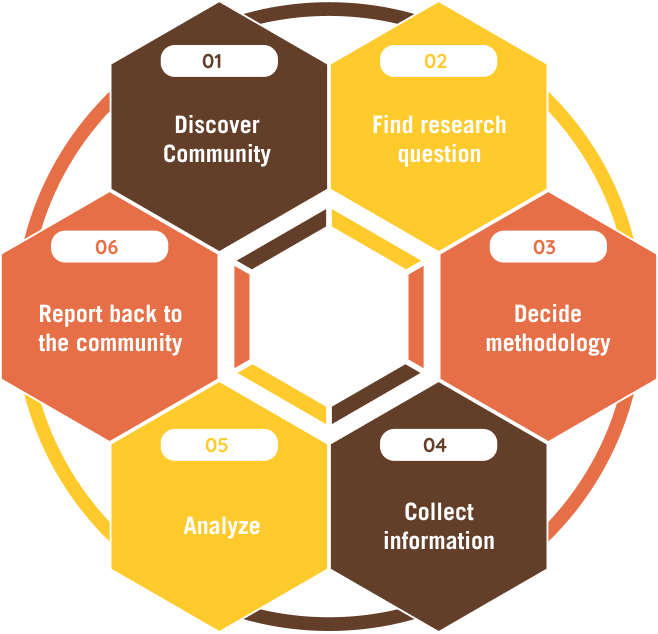
From diving into community discovery to reporting back with insights
CEEP is a 360° approach to experiential learning. Our structured six-step process ensures every learner gets a holistic and practical educational experience.

“I'm fearful of taking the next step [as an entrepreneur]. I was constantly thinking of the negative and not the positive. CEEP got me to take that first step.
-Charisse Williams
Sophomore student, CUNY
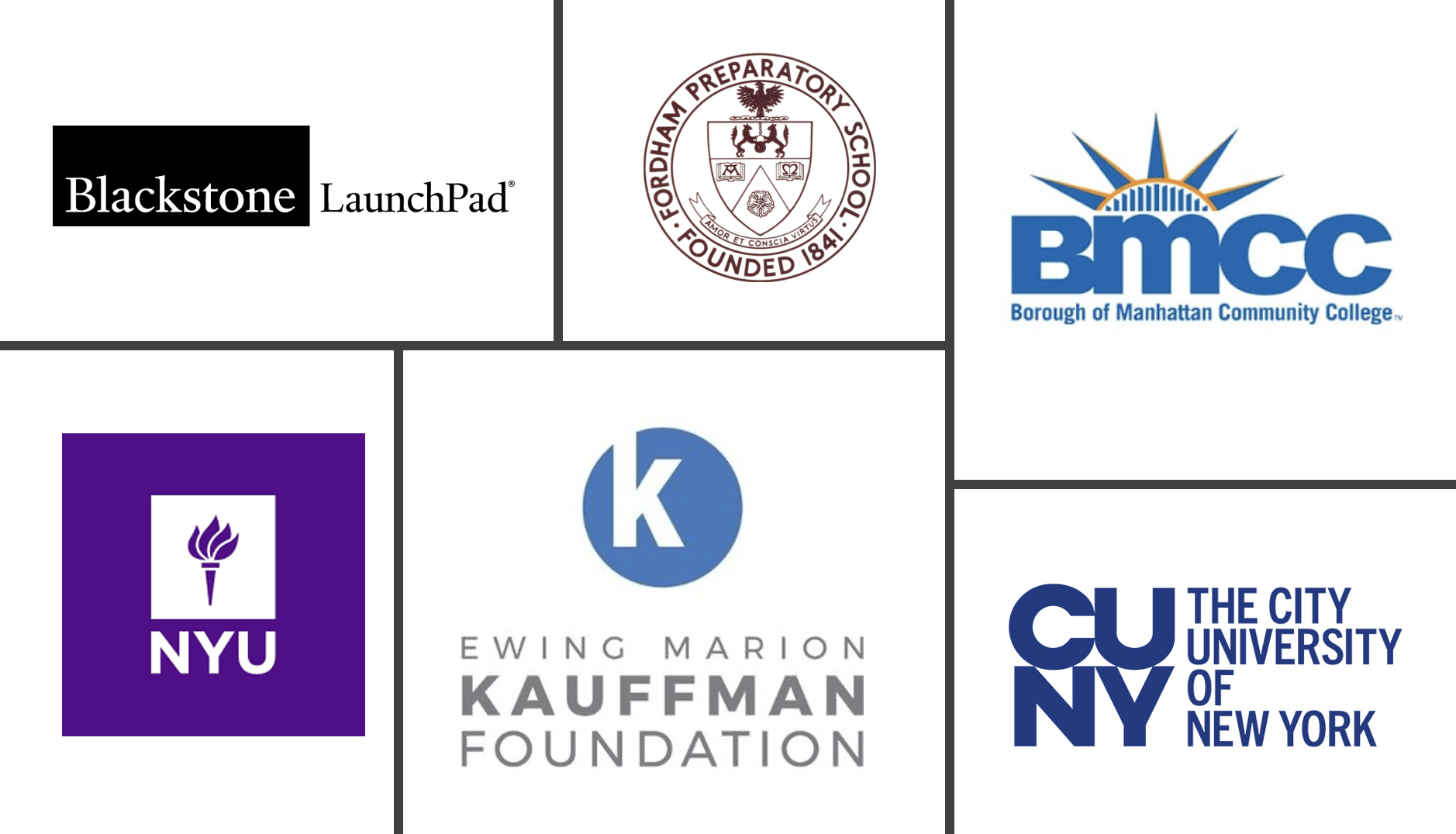
JOIN THIS VIBRANT COMMUNITY
Sign up now and grab your free experiential learning materials. Elevate your teaching. Engage your students. Enrich the community. With CEEP, everyone wins!
